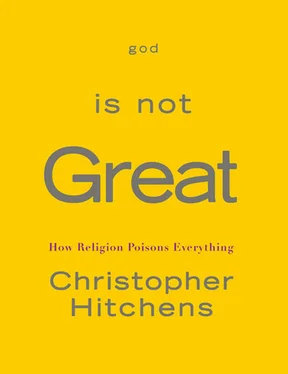Christopher Hitchens - God Is Not Great
Здесь есть возможность читать онлайн «Christopher Hitchens - God Is Not Great» весь текст электронной книги совершенно бесплатно (целиком полную версию без сокращений). В некоторых случаях можно слушать аудио, скачать через торрент в формате fb2 и присутствует краткое содержание. Город: New York, Год выпуска: 2007, ISBN: 2007, Издательство: Twelve Books, Жанр: Публицистика, на английском языке. Описание произведения, (предисловие) а так же отзывы посетителей доступны на портале библиотеки ЛибКат.
- Название:God Is Not Great
- Автор:
- Издательство:Twelve Books
- Жанр:
- Год:2007
- Город:New York
- ISBN:978-0-446-19534-8
- Рейтинг книги:3 / 5. Голосов: 1
-
Избранное:Добавить в избранное
- Отзывы:
-
Ваша оценка:
- 60
- 1
- 2
- 3
- 4
- 5
God Is Not Great: краткое содержание, описание и аннотация
Предлагаем к чтению аннотацию, описание, краткое содержание или предисловие (зависит от того, что написал сам автор книги «God Is Not Great»). Если вы не нашли необходимую информацию о книге — напишите в комментариях, мы постараемся отыскать её.
and Sam Harris’s recent bestseller,
, Christopher Hitchens makes the ultimate case against religion. With a close and erudite reading of the major religious texts, he documents the ways in which religion is a man-made wish, a cause of dangerous sexual repression, and a distortion of our origins in the cosmos. With eloquent clarity, Hitchens frames the argument for a more secular life based on science and reason, in which hell is replaced by the Hubble Telescope’s awesome view of the universe, and Moses and the burning bush give way to the beauty and symmetry of the double helix.
God Is Not Great — читать онлайн бесплатно полную книгу (весь текст) целиком
Ниже представлен текст книги, разбитый по страницам. Система сохранения места последней прочитанной страницы, позволяет с удобством читать онлайн бесплатно книгу «God Is Not Great», без необходимости каждый раз заново искать на чём Вы остановились. Поставьте закладку, и сможете в любой момент перейти на страницу, на которой закончили чтение.
Интервал:
Закладка:
If true, this would date the Koran to a time fairly close to Muhammad’s own life. But we swiftly discover that there is no certainty or agreement about the truth of the story. Some say that it was Ali—the fourth and not the first caliph, and the founder of Shiism—who had the idea. Many others—the Sunni majority—assert that it was Caliph Uthman, who reigned from 644 to 656, who made the finalized decision. Told by one of his generals that soldiers from different provinces were fighting over discrepant accounts of the Koran, Uthman ordered Zaid ibn Thabit to bring together the various texts, unify them, and have them transcribed into one. When this task was complete, Uthman ordered standard copies to be sent to Kufa, Basra, Damascus, and elsewhere, with a master copy retained in Medina. Uthman thus played the canonical role that had been taken, in the standardization and purging and censorship of the Christian Bible, by Irenaeus and by Bishop Athanasius of Alexandria. The roll was called, and some texts were declared sacred and inerrant while others became “apocryphal.” Outdoing Athanasius, Uthman ordered that all earlier and rival editions be destroyed.
Even supposing this version of events to be correct, which would mean that no chance existed for scholars ever to determine or even dispute what really happened in Muhammad’s time, Uthman’s attempt to abolish disagreement was a vain one. The written Arabic language has two features that make it difficult for an outsider to learn: it uses dots to distinguish consonants like “b” and “t,” and in its original form it had no sign or symbol for short vowels, which could be rendered by various dashes or comma-type marks. Vastly different readings even of Uthman’s version were enabled by these variations. Arabic script itself was not standardized until the later part of the ninth century, and in the meantime the undotted and oddly voweled Koran was generating wildly different explanations of itself, as it still does. This might not matter in the case of the Iliad , but remember that we are supposed to be talking about the unalterable (and final ) word of god. There is obviously a connection between the sheer feebleness of this claim and the absolutely fanatical certainty with which it is advanced. To take one instance that can hardly be called negligible, the Arabic words written on the outside of the Dome of the Rock in Jerusalem are different from any version that appears in the Koran.
The situation is even more shaky and deplorable when we come to the hadith, or that vast orally generated secondary literature which supposedly conveys the sayings and actions of Muhammad, the tale of the Koran’s compilation, and the sayings of “the companions of the Prophet.” Each hadith, in order to be considered authentic, must be supported in turn by an isnad , or chain, of supposedly reliable witnesses. Many Muslims allow their attitude to everyday life to be determined by these anecdotes: regarding dogs as unclean, for example, on the sole ground that Muhammad is said to have done so. (My own favorite tale goes the other way: the Prophet is said to have cut off the long sleeve of his garment rather than disturb a cat that was slumbering on it. Cats in Muslim lands have been generally spared the awful treatment visited on them by Christians, who have often regarded them as satanic familiars of witches.)
As one might expect, the six authorized collections of hadith, which pile hearsay upon hearsay through the unwinding of the long spool of isnads (“A told B, who had it from C, who learned it from D”), were put together centuries after the events they purport to describe. One of the most famous of the six compilers, Bukhari, died 238 years after the death of Muhammad. Bukhari is deemed unusually reliable and honest by Muslims, and seems to have deserved his reputation in that, of the three hundred thousand attestations he accumulated in a lifetime devoted to the project, he ruled that two hundred thousand of them were entirely valueless and unsupported. Further exclusion of dubious traditions and questionable isnads reduced his grand total to ten thousand hadith. You are free to believe, if you so choose, that out of this formless mass of illiterate and half-remembered witnessing the pious Bukhari, more than two centuries later, managed to select only the pure and undefiled ones that would bear examination.
Some of these candidates for authenticity might have been easier to sift out than others. The Hungarian scholar Ignaz Goldziher, to quote a recent study by Reza Aslan, was among the first to show that many of the hadith were no more than “verses from the Torah and the Gospels, bits of Rabbinic sayings, ancient Persian maxims, passages of Greek philosophy, Indian proverbs, and even an almost word-for-word reproduction of the Lord’s Prayer.” Great chunks of more or less straight biblical quotation can be found in the hadith, including the parable of the workers hired at the last moment, and the injunction “Let not thy left hand know what thy right hand doeth,” the last example meaning that this piece of pointless pseudoprofundity has a place in two sets of revealed scripture. Aslan notes that by the time of the ninth century, when Muslim legal scholars were attempting to formulate and codify Islamic law through the process known as ijtihad , they were obliged to separate many hadith into the following categories: “lies told for material gain and lies told for ideological advantage.” Quite rightly, Islam effectively disowns the idea that it is a new faith, let alone a cancellation of the earlier ones, and it uses the prophecies of the Old Testament and the Gospels of the New like a perpetual crutch or fund, to be leaned on or drawn upon. In return for this derivative modesty, all it asks is to be accepted as the absolute and final revelation.
As might be expected, it contains many internal contradictions. It is often cited as saying that “there is no compulsion in religion,” and as making reassuring noises about those of other faiths being peoples “of the book” or “followers of an earlier revelation.” The idea of being “tolerated” by a Muslim is as repulsive to me as the other condescensions whereby Catholic and Protestant Christians agreed to “tolerate” one another, or extend “toleration” to Jews. The Christian world was so awful in this respect, and for so long, that many Jews preferred to live under Ottoman rule and submit to special taxes and other such distinctions. However, the actual Koranic reference to Islam’s benign tolerance is qualified, because some of these same “peoples” and “followers” may be “such of them as are bent on evil-doing.” And it takes only a short acquaintance with the Koran and the hadith to discover other imperatives, such as the following:
Nobody who dies and finds good from Allah (in the hereafter) would wish to come back to this world even if he were given the whole world and whatever is in it, except the martyr who, on seeing the superiority of martyrdom, would like to come back to the world and be killed again.
Or:
God will not forgive those who serve other gods beside Him; but he will forgive whom He will for other sins. He that serves other gods besides God is guilty of a heinous sin.
I chose the first of these two violent excerpts (from a whole thesaurus of unsavory possible ones) because it so perfectly negates what Socrates is reported to have said in Plato’s Apology (to which I am coming). And I chose the second because it is such a patent and abject borrowing from the “Ten Commandments.”
The likelihood that any of this humanly derived rhetoric is “inerrant,” let alone “final,” is conclusively disproved not just by its innumerable contradictions and incoherencies but by the famous episode of the Koran’s alleged “satanic verses,” out of which Salman Rushdie was later to make a literary project. On this much-discussed occasion, Muhammad was seeking to conciliate some leading Meccan poly-theists and in due course experienced a “revelation” that allowed them after all to continue worshipping some of the older local deities. It struck him later that this could not be right and that he must have inadvertently been “channeled” by the devil, who for some reason had briefly chosen to relax his habit of combating monotheists on their own ground. (Muhammad believed devoutly not just in the devil himself but in minor desert devils, or djinns , as well.) It was noticed even by some of his wives that the Prophet was capable of having a “revelation” that happened to suit his short-term needs, and he was sometimes teased about it. We are further told—on no authority that need be believed—that when he experienced revelation in public he would sometimes be gripped by pain and experience loud ringing in his ears. Beads of sweat would burst out on him, even on the chilliest of days. Some heartless Christian critics have suggested that he was an epileptic (though they fail to notice the same symptoms in the seizure experienced by Paul on the road to Damascus), but there is no need for us to speculate in this way. It is enough to rephrase David Hume’s unavoidable question. Which is more likely—that a man should be used as a transmitter by god to deliver some already existing revelations, or that he should utter some already existing revelations and believe himself to be, or claim to be, ordered by god to do so? As for the pains and the noises in the head, or the sweat, one can only regret the seeming fact that direct communication with god is not an experience of calm, beauty, and lucidity.
Читать дальшеИнтервал:
Закладка:
Похожие книги на «God Is Not Great»
Представляем Вашему вниманию похожие книги на «God Is Not Great» списком для выбора. Мы отобрали схожую по названию и смыслу литературу в надежде предоставить читателям больше вариантов отыскать новые, интересные, ещё непрочитанные произведения.
Обсуждение, отзывы о книге «God Is Not Great» и просто собственные мнения читателей. Оставьте ваши комментарии, напишите, что Вы думаете о произведении, его смысле или главных героях. Укажите что конкретно понравилось, а что нет, и почему Вы так считаете.












